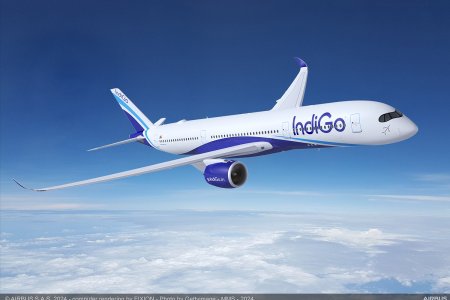India travel chaos worsens as IndiGo cancels hundreds of flights
India's travel chaos has worsened after the country's largest airline IndiGo cancelled hundreds of scheduled flights on Friday after three days of widespread disruption across its network.
The carrier, which has a 60% market share in India and flies more than 2,000 flights a day, has been facing pilot shortages after it failed to adapt to new crew rostering rules.
Thousands of passengers are stranded across India in what's a busy travel season, with all IndiGo flights from the capital Delhi cancelled.
IndiGo has said operations will return to full normalcy only by 10 February, and has sought temporary relief on the new rules that call for more rest hours and restricted night-duty.
The airline has also said it will reduce its flight operations to minimise disruptions from 8 December.
The government has said it is closely monitoring the situation with the federal aviation minister expressing "clear displeasure" with how the airline had handled the situation.
In a separate statement, India's aviation regulator said the disruptions were primarily on account of "misjudgment and planning gaps" in implementing the new flight duty time limitation rules.
The regulator has directed IndiGo to submit a detailed plan on crew recruitment, training, roster restructuring, safety-risk assessments and other mitigation measures with immediate effect.
Local media reports say IndiGo has been granted a waiver from the new pilot rest rules, and the ban on combining pilot leave with weekly rest has been eased to stabilise operations. The BBC has not been able to independently verify this.
But the airline has attracted sharp criticism from the Airline Pilots Association of India, which said any relief granted to the airline on duty timings undermines the spirit of the new regulations and "gravely" compromises the safety of the flying public.
Under the new rules pilots are given more rest, with one of the major changes mandating pilots to make two night-time landings per week, down from six under the old rules.
December is a busy travel month in India, when school holidays and the peak wedding season gets under way.
IndiGo has said it will waive off all cancellation/reschedule requests for travel between 5 and 15 December. It is also arranging for hotel rooms and food for passengers whose travel has been disrupted.
But several passengers have taken to social media, expressing anger about not being given up-to-date information and remaining stranded at the airport without food.
Singapore's High Commissioner to India Simon Wong said he was "lost for words" as he joined the thousands stranded at the airport, having to miss the wedding of his young staff member.
Major airports in Delhi, Mumbai and other cities have issued advisories asking passengers to check the status of their flights before heading to the airport.
IndiGo, India's largest carrier, has said operations will return to full normalcy only by 10 February.

www.bbc.com

















